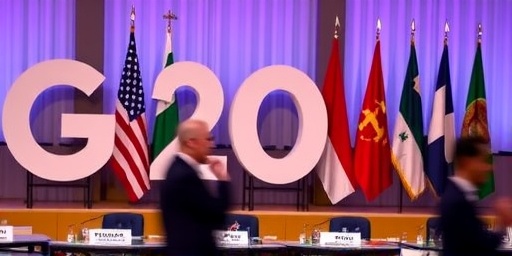In a bold move that underscores shifting alliances in international diplomacy, leaders from 19 nations and the European Union convened in Johannesburg, South Africa, to adopt a comprehensive economic declaration at the G20 summit, proceeding without the participation of the United States. President Donald Trump’s decision to boycott the event has sent ripples through the global economy, marking one of the most significant absences in the group’s 25-year history and highlighting deepening divisions over trade, climate policy, and multilateralism.
The summit, hosted under the theme ‘Building a Resilient Global Economy for Sustainable Development,’ saw delegates from countries including China, Germany, India, and Brazil forging ahead with agreements aimed at countering economic uncertainties exacerbated by recent geopolitical tensions. The U.S. boycott, announced by the White House just weeks before the event, cited disagreements over what Trump described as ‘unfair trade practices’ and ‘one-sided climate commitments’ that he claimed disadvantage American workers. This rare exclusion of a major power has prompted questions about the future efficacy of the G20 as the premier forum for global economic coordination.
Trump’s Boycott Ignites Diplomatic Firestorm
President Trump’s choice to skip the G20 summit has drawn sharp criticism from allies and adversaries alike, framing the U.S. boycott as a unilateral act that undermines collective efforts to stabilize the global economy. Speaking from the White House Rose Garden, Trump justified the absence by stating, ‘America will not be lectured by nations that don’t play fair. We’re putting American interests first, and that means walking away from deals that hurt our farmers and manufacturers.’ His remarks echoed longstanding grievances with international bodies, reminiscent of his withdrawal from the Paris Climate Agreement and renegotiation of NAFTA into the USMCA.
The decision wasn’t without internal debate. Reports from Washington indicate that Treasury Secretary Steven Mnuchin and Commerce Secretary Wilbur Ross advocated for attendance to influence outcomes, but Trump’s inner circle, including trade advisor Peter Navarro, prevailed with arguments that participation would signal weakness. The boycott extends beyond the president; no high-level U.S. delegation attended, leaving the American seat symbolically empty during plenary sessions.
Internationally, the move has elicited a spectrum of responses. European leaders, who have increasingly coordinated on economic policy post-Brexit, expressed dismay. German Chancellor Angela Merkel, a key architect of the summit’s agenda, remarked during a press briefing, ‘The G20 is stronger when all voices are heard, but we cannot allow one nation’s absence to derail progress on issues that affect billions.’ Similarly, French President Emmanuel Macron called the boycott ‘regrettable and shortsighted,’ warning of potential fragmentation in global supply chains.
In Asia, Chinese President Xi Jinping seized the opportunity to position Beijing as a leader in multilateralism. At the summit’s opening, Xi delivered a speech emphasizing ‘inclusive growth,’ subtly contrasting it with what he termed ‘protectionist tendencies’ from Washington. Indian Prime Minister Narendra Modi echoed this sentiment, noting that the economic declaration represents ‘a step toward equitable development without the baggage of bilateral disputes.’
The diplomatic fallout extends to bilateral relations. South African President Cyril Ramaphosa, the host, privately conveyed disappointment to U.S. Ambassador Lana Marks, highlighting how the boycott overshadowed Africa’s push for investment in green infrastructure. Analysts suggest this could strain U.S.-Africa ties at a time when China is expanding its influence through the Belt and Road Initiative.
Core Elements of the G20 Economic Declaration Unveiled
Despite the void left by the U.S. boycott, the G20 delegates in Johannesburg rallied to approve a 28-page economic declaration that addresses pressing challenges in the global economy. Titled ‘Johannesburg Compact for Sustainable Prosperity,’ the document outlines commitments across trade, finance, and sustainability, with a focus on post-pandemic recovery and climate resilience.
At its heart, the declaration pledges to enhance international trade cooperation by reducing non-tariff barriers and promoting digital economy standards. It includes a specific target to increase intra-G20 trade by 15% over the next five years, supported by harmonized customs procedures. This comes amid a backdrop of rising protectionism; according to the World Trade Organization, global trade growth slowed to 1.7% in 2023, partly due to U.S.-China tariffs imposed during Trump’s first term.
On fiscal matters, the agreement calls for coordinated debt relief for low-income countries, estimating a need for $500 billion in multilateral support through 2030. Brazil’s Finance Minister Paulo Guedes highlighted this provision, stating, ‘We’ve learned from the COVID-19 crisis that no economy is an island. This declaration ensures that vulnerable nations aren’t left behind in the recovery.’ The document also endorses a minimum global corporate tax rate of 15%, a nod to ongoing OECD negotiations, though it stops short of enforcement mechanisms without U.S. buy-in.
Climate and sustainability form another pillar, with commitments to mobilize $100 billion annually in climate finance from G20 members to developing nations—a goal first set in 2009 but repeatedly missed. The declaration introduces new metrics, including a ‘green investment scorecard’ to track progress on renewable energy transitions. South Africa’s delegation pushed for emphasis on just energy transitions, citing the country’s coal dependency and the need for $8.5 billion in annual funding to phase out fossil fuels by 2050.
Statistics underscore the urgency: The International Monetary Fund projects global GDP growth at 3.2% for 2024, but warns of downside risks from trade wars and energy volatility. The economic declaration responds with a framework for ‘resilient supply chains,’ urging diversification away from over-reliance on single markets—a veiled reference to U.S.-China decoupling.
To ensure accountability, the document establishes a G20 Economic Monitoring Group, comprising finance ministers who will convene biannually to review implementation. This body aims to fill the gap left by the absent U.S., potentially shifting the G20‘s dynamics toward greater influence from emerging economies like the BRICS bloc.
U.S. Absence Reshapes Global Economic Alliances
The U.S. boycott of the G20 summit has accelerated a realignment in the global economy, with non-U.S. members stepping up to lead on key initiatives. Economists note that this marks a pivotal moment, as the group—representing 85% of global GDP—adapts to a multipolar world where America’s influence wanes under Trump’s ‘America First’ doctrine.
China and the European Union emerged as de facto leaders in Johannesburg. Beijing proposed an ‘Asia-Africa Economic Corridor’ within the declaration, integrating G20 trade pacts with its Belt and Road projects to boost infrastructure in 20 African nations. This initiative, backed by $200 billion in pledged investments, could rival U.S. development aid programs like the Prosper Africa strategy, which has allocated just $1.2 billion since 2018.
Europe, meanwhile, championed digital and green standards. The EU’s push for data privacy norms in the economic declaration aligns with GDPR, potentially creating a unified regulatory bloc that excludes U.S. tech giants unless they comply. A European Commission report estimates this could add €150 billion to the bloc’s economy by 2025 through enhanced cross-border data flows.
Emerging markets, particularly from the Global South, gained amplified voices. Indonesia’s President Joko Widodo advocated for reforms in the World Bank and IMF to increase voting shares for developing countries, a provision echoed in the declaration. This reflects a broader trend: G20 summits since 2018 have seen a 30% uptick in agenda items focused on inequality, per a Brookings Institution analysis.
The Trump-led absence also spotlighted tensions over currency policies. Without U.S. input, the group reaffirmed commitments to exchange rate stability, implicitly critiquing the dollar’s dominance. The declaration supports exploring a basket of currencies for IMF reserves, a move that could dilute the dollar’s role in global trade, which currently accounts for 60% of transactions.
Market reactions were immediate. The dollar index dipped 0.5% on the first day of the summit, while the euro strengthened amid optimism over EU-led initiatives. Stock markets in Shanghai and Mumbai rose 1.2% and 0.8%, respectively, signaling investor confidence in non-U.S. growth drivers.
World Leaders Voice Concerns Over Fractured G20 Unity
As the Johannesburg summit concluded, world leaders grappled with the implications of the U.S. boycott, offering candid assessments that reveal cracks in the G20‘s foundation. Japanese Prime Minister Yoshihide Suga, whose country holds the 2023 presidency, warned, ‘The absence of the United States today is a loss for all; tomorrow’s challenges demand our collective strength.’ Suga’s comments underscore Japan’s delicate balancing act between its U.S. alliance and Asian economic ties.
In Latin America, Argentine President Alberto Fernández criticized the boycott as ‘selfish isolationism,’ linking it to broader U.S. policies that have hindered regional recovery from hyperinflation and debt crises. Fernández’s administration, facing a 50% poverty rate, had hoped for stronger G20 commitments on commodity prices, which the declaration partially addresses through a new volatility monitoring mechanism.
African leaders, led by Ramaphosa, framed the event as a ‘new dawn’ for the continent. ‘With or without the U.S., the G20 is affirming Africa’s role in shaping the global economy,’ Ramaphosa declared in his closing address. The summit resulted in side deals, including $50 billion in green bonds for African renewable projects, co-financed by the EU and China.
Even neutral observers like the United Nations Secretary-General António Guterres weighed in, urging reconciliation: ‘The economic declaration is a testament to resilience, but true progress requires inclusivity. I call on President Trump to reconsider engagement for the sake of planetary well-being.’
Quotes from civil society added depth to the discourse. Oxfam International’s executive director, Winnie Byanyima, praised the declaration’s focus on inequality but lamented, ‘The U.S. boycott risks entrenching a two-tiered world economy, where the rich get richer while the poor pay the price.’ Environmental groups like Greenpeace highlighted the climate pledges as ‘a fragile victory,’ stressing the need for enforcement amid rising global temperatures.
Behind closed doors, informal talks revealed efforts to bridge the divide. EU foreign policy chief Josep Borrell indicated willingness to engage bilaterally with Washington on select issues, such as supply chain security, to prevent total G20 paralysis.
Prospects for Global Economic Stability in a Post-Johannesburg Era
Looking ahead, the Johannesburg G20 summit’s economic declaration sets the stage for a transformed global economy, one where the U.S. boycott under Trump may catalyze deeper cooperation among remaining members. Implementation will be key, with the next G20 finance ministers’ meeting in Rome slated for February 2024 to operationalize trade and finance commitments.
Experts predict varied outcomes. A report from the Peterson Institute for International Economics forecasts that full adherence to the declaration could boost global GDP by 0.5% annually through 2030, offsetting losses from protectionist policies. However, without U.S. participation, challenges persist in areas like intellectual property and dispute resolution.
Emerging powers are poised to fill the vacuum. China’s planned $1 trillion infrastructure push aligns with declaration goals, potentially reshaping trade routes and reducing dependence on Atlantic alliances. Meanwhile, the EU’s Green Deal, now intertwined with G20 pledges, aims to create 1 million jobs in sustainable sectors by 2025.
For the U.S., the boycott’s long-term costs could mount. Isolation risks ceding leadership on standards that American firms rely on, such as 5G and AI governance. Bipartisan voices in Congress, including Senator Mitt Romney, have called for reevaluation, arguing that ‘America’s economic security depends on global partnerships, not walls.’
Africa stands to benefit most immediately, with Johannesburg’s outcomes feeding into the African Continental Free Trade Area (AfCFTA). Projections from the African Development Bank suggest a 7% GDP uplift by 2035 if G20 investments materialize, fostering intra-African trade currently at just 18% of total commerce.
Ultimately, the summit’s legacy will hinge on adaptability. As climate events intensify—evidenced by 2023’s record heatwaves affecting 40% of G20 economies—and geopolitical flashpoints like Ukraine persist, the economic declaration offers a blueprint for resilience. Whether the U.S. rejoins the fold remains uncertain, but the G20 has demonstrated it can advance without its largest member, signaling a more balanced era in international economic governance.








